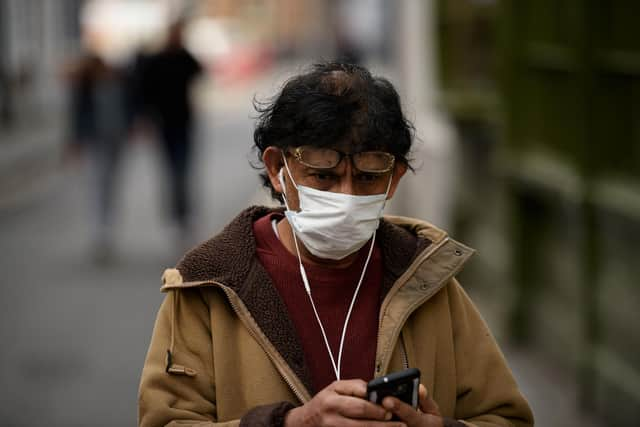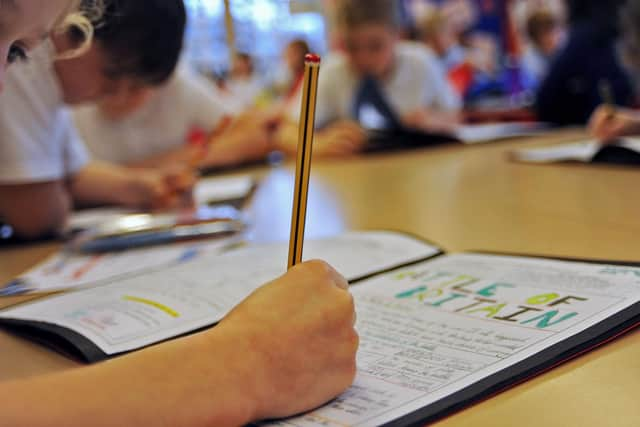Coronavirus: Government updates full list of key workers whose children can keep going to school
and live on Freeview channel 276
In a new announcement today as the UK battle the coronavirus pandemic which is sweeping the country, the government updated the list of those professions which are needed on the frontline.
Children of those key workers can still attend school, which close for most students today in a bid to prevent the spread of Covid-19.
Advertisement
Hide AdAdvertisement
Hide AdThe government said: “As a country, we all need to do what we can to reduce the spread of the COVID-19 virus.


“That is why the government has given clear guidance on self-isolation, household isolation and social distancing.
“And the most recent scientific advice on how to further limit the spread of COVID-19 is clear. If children can stay safely at home, they should, to limit the chance of the virus spreading.
“That is why the government has asked parents to keep their children at home, wherever possible, and asked schools to remain open only for those children who absolutely need to attend.
Advertisement
Hide AdAdvertisement
Hide Ad“It is important to underline that schools, colleges and other educational establishments remain safe places for children. But the fewer children making the journey to school, and the fewer children in educational settings, the lower the risk that the virus can spread and infect vulnerable individuals in wider society.”


Schools will remain open for vulnerable children including those supported by social care, those with safeguarding and welfare needs including child in need plans, on child protection plans, ‘looked after’ children, young carers, disabled children and those with education, health and care plans.
Parents whose work is deemed critical to the COVID-19 national response include those who work in health and social care.
But the government stressed: “Many parents working in these sectors may be able to ensure their child is kept at home. And every child who can be safely cared for at home should be.
Advertisement
Hide AdAdvertisement
Hide Ad“Please, therefore, follow these key principles – if it is at all possible for children to be at home, then they should be; if a child needs specialist support, is vulnerable or has a parent who is a critical worker, then educational provision will be available for them; parents should not rely for childcare upon those who are advised to be in the stringent social distancing category such as grandparents, friends, or family members with underlying conditions.
“Parents should also do everything they can to ensure children are not mixing socially in a way which can continue to spread the virus. They should observe the same social distancing principles as adults.”
Residential special schools, boarding schools and special settings continue to care for children wherever possible.
Eduction will be provided for the children of parents in the following sectors:
- Health and social care
Advertisement
Hide AdAdvertisement
Hide AdThis includes but is not limited to doctors, nurses, midwives, paramedics, social workers, care workers, and other frontline health and social care staff including volunteers; the support and specialist staff required to maintain the UK’s health and social care sector; those working as part of the health and social care supply chain, including producers and distributers of medicines and medical and personal protective equipment.
- Education and childcare:
This includes nursery and teaching staff, social workers and those specialist education professionals who must remain active during the COVID-19 response.
- Key public services:
This includes those essential to the running of the justice system, religious staff, charities and workers delivering key frontline services, those responsible for the management of the deceased, and journalists and broadcasters who are providing public service broadcasting.
- Local and national government:
This only includes those administrative occupations essential to the effective delivery of the COVID-19 response or delivering essential public services such as the payment of benefits, including in government agencies and arms length bodies.
- Food and other necessary goods:
Advertisement
Hide AdAdvertisement
Hide AdThis includes those involved in food production, processing, distribution, sale and delivery as well as those essential to the provision of other key goods such as hygienic and veterinary medicines.
- Public safety and national security:
This includes police and support staff, Ministry of Defence civilians, contractor and armed forces personnel, fire and rescue service employees,including support staff, National Crime Agency staff, those maintaining border security, prison and probation staff and other national security roles, including those overseas.
- Transport:
This includes those who will keep the air, water, road and rail passenger and freight transport modes operating during the COVID-19 response, including those working on transport systems through which supply chains pass.
- Utilities, communication and financial services:
This includes staff needed for essential financial services provision, including but not limited to workers in banks, building societies and financial market infrastructure, the oil, gas, electricity and water sectors, including sewerage, information technology and data infrastructure sector and primary industry supplies to continue during the COVID-19 response, as well as key staff working in the civil nuclear, chemicals, telecommunications, including but not limited to network operations, field engineering, call centre staff, IT and data infrastructure, 999 and 111 critical services, postal services and delivery, payments providers and waste disposal sectors.
Comment Guidelines
National World encourages reader discussion on our stories. User feedback, insights and back-and-forth exchanges add a rich layer of context to reporting. Please review our Community Guidelines before commenting.